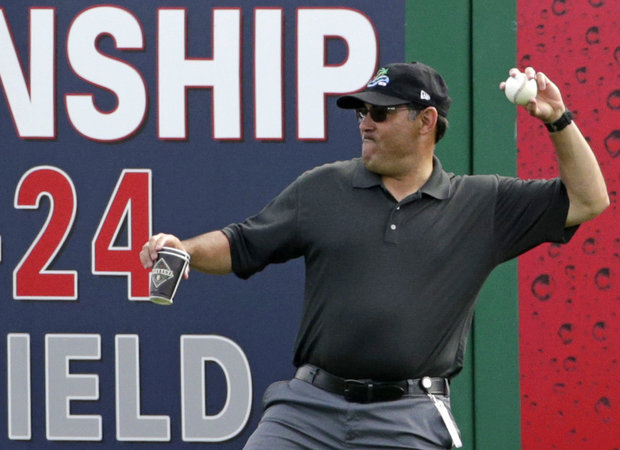I don’t think I’m overstating that, am I? Maybe I am. Yeah, I really am. I don’t care, though. I don’t care because Ruben Amaro, Jr. actually had the gall – the balls, even – to say that the reason he never talked about analytics as the general manager of the Phillies was because he was gaining a competitive advantage by doing so. That competitive advantage went 290-358 the last four years. GREAT JOB DUPING EVERYONE, RUBE! YOU SURE GOT THEM ALL! THEY ALL HAVE NO IDEA HOW TRULY SHITTY OF AN ANALYTICS DEPARTMENT THE PHILLIES HAD! OR DIDN’T HAVE! IT DOESN’T MATTER!
Here’s what he said to FanGraphs’ David Laurila, via Hardball Talk:
You can’t ever deny the numbers. That’s true for every GM and every baseball person, regardless of whether you’re ‘old school’ or ‘new school.’ When a scout walks in, the first thing he does is pick up a stat sheet and look at what the player does and what he’s been doing. The numbers don’t lie.
“I’ve always believed in analytics. I just didn’t make it all public (in Philadelphia). I thought it was more of a competitive advantage for me to keep our thought-process about analytics closer to the vest. We didn’t boast about what we were doing — we didn’t discuss it openly — because I didn’t think it was anybody’s business but our own as to how we evaluated.
“We got a little more aggressive, as far as building our analytics department, probably three-or-so years ago. It did maybe become a little more public then. But that doesn’t mean we weren’t utilizing analytics to some degree earlier than that.”
Oh, Rube. Stick it, Rube. Rube, I hate you, Rube. What the hell kind of shit is that? “I always believed in Santa, I just didn’t make it all public because the people who didn’t believe in Santa were totally missing out.”
Now, I understand how competitive advantage works. I’ve been there. But, why the hell would Amaro try to hide something that he was well-known for in the league as being behind the times on? He’s just trying to save face here. There’s no chance he’s telling the truth, is there? Bill Baer cites an article from January 2010 from MLB.com on what special assistant Charley Kerfeld said regarding analytics when he was with the Phillies.
And since I’ve been here, we don’t have an in-house stats guy and I kind of feel we never will. We’re not a statistics-driven organization by any means.” He added, “I’m not against statistics. Everybody has their own way of doing things. But the Phillies believe in what our scouts see and what our eyes tell us and what our people tell us.”
There’s absolutely a chance Amaro changed the way the organization did things – but who in their right mind would believe that? He signed Jeff Francoeur. He was a bad general manager when not given prospects to trade away for star pitchers. And he won those trades! That makes his statement about analytics even more ridiculous. He has no clue. But he tries to sound like he does, and it’s infuriating.
On balancing analytics and scouting: “I believe in trends. I believe in experience. I think there are trends that can be enlightening, and there are others that aren’t as enlightening. As players get closer to the major leagues — when they’re in the high minors — that’s when you can start paying a little closer attention to the meta-data, the bigger data. You’re getting a lot more bulk as far as information is concerned.
“When you’re making evaluations on players, and trying to build a club, it’s important to always have a combination of scouting, player development, and analytics. You bring them all together. That said, if I were to err, I would err on the side of what our scouts see with their eyes, and what they can glean from our players’ hearts and heads. But that doesn’t tell the whole story, either. There is a whole other story to evaluating players and talent.”
On Statcast and medical data: “(Statcast) is something we paid attention to — there’s valuable information there — although I think there are still some kinks to be worked out. And just like anything else, sometimes things can be overanalyzed a little too much. But there’s nothing wrong with having as much information as possible, so once the glitches are straightened out, we’ll all be utilizing it even better.
“I was a biology major (at Stanford) and my area of concentration was physical therapy and sports medicine, so when I looked at medical reports, I knew a little more about them than most guys would. I was very proud of our medical staff in Philadelphia. Mike Ciccotte and Scott Sheridan were very knowledgeable. They were always learning about, and developing, preventative measures.”
Shut up and stick to coaching first base, Rube. Some of those kids don’t remember the signs.
Read more here. If you dare.


He destroyed baseball in Philadelphia
I think ruben gets a bad rap, although he wasn’t the greatest GM he is a very good color commentator. He is very insightful and knowledgeable of the game of baseball and he is very funny.